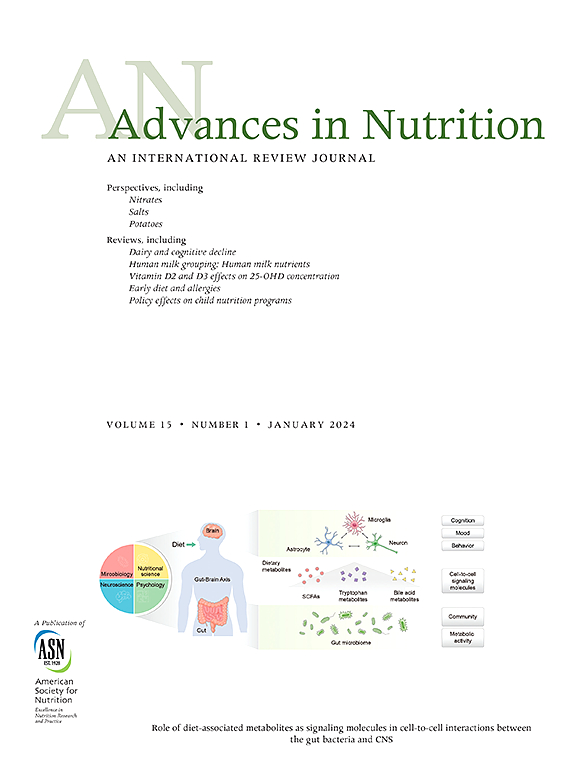动物源性食品的最佳摄入量:为世卫组织新指南提供信息的范围审查。
IF 9.2
1区 医学
Q1 NUTRITION & DIETETICS
引用次数: 0
摘要
背景:目前,可能成为健康饮食一部分的动物源食品的数量和类型仍不清楚。这项工作是世卫组织委托开展的,目的是制定一项关于动物源性食品最佳摄入量的新指南。目的:本综述旨在收集和描述动物源性食品和健康结果的现有证据。方法:对Embase、Medline和PubMed进行系统检索,并对近期的营养指南进行检索,以确定2019年至2024年间发表的系统性、范围和总括性综述。纳入前瞻性观察性和干预性研究的综述,这些研究的参与者年龄≥2岁,来自普通人群,包括孕妇,评估动物源食品(肉、禽、鱼、蛋、乳制品)的影响,并作为比较,选择富含蛋白质的植物源食品对任何健康结果的影响。采用挖掘方法,提取了综述中确定的前瞻性观察性和干预性初步研究。利用证据图描述了研究的可用性和差距。结果:从确定的7458条记录中,共纳入652篇综述,包括来自65个国家的488个独特队列的1626篇符合条件的出版物,以及来自37个国家的387个独特试验的480篇符合条件的出版物。单一健康结果被分为29组。最常被研究的结果组是癌症、心血管疾病、糖尿病、体重和成分,以及全因死亡率。在撒哈拉以南非洲、中亚和东南亚,粮食不安全地区的老年人、儿童和孕妇中发现了证据缺口。结论:这项范围审查对动物源食品和健康结果的现有证据进行了全面概述,并确定了关键的研究差距,以支持制定新的营养指南。重要性声明:尽管人们对健康和可持续饮食中动物源食品的最佳摄入量越来越感兴趣和争论,但据我们所知,没有系统的综述总结了所有动物源食品和无限健康结果的可用证据。通过这一范围综述,我们在证据差距图的帮助下,综合了所有动物源性食品和所有健康结果的所有可获得的关于该主题的所有综述,这些综述可用于制定基于食物的营养指南。本文章由计算机程序翻译,如有差异,请以英文原文为准。
Optimal Intake of Animal-Source Foods: A Scoping Review to Inform a New WHO Guideline
Currently, the amount and types of animal-source foods that might be part of a healthy diet remain unclear. This scoping review was commissioned by the WHO for the development of a new guideline on optimal intake of animal-source foods and aimed to collect and describe the evidence available on animal-source foods and health outcomes. A systematic search of Embase, Medline, and PubMed, complemented with a search of recent nutrition guidelines, was conducted to identify systematic, scoping, and umbrella reviews published between 2019 and 2024. Reviews of prospective observational and interventional studies with participants ≥2 y from the general population, including pregnant women, assessing the effects of animal-source foods (red meat, poultry, fish, eggs, dairy) and as comparators selected protein-rich plant-source foods on any health outcome were included. Using a mining approach, prospective observational and interventional primary studies identified in the reviews were extracted. Research availability and gaps were depicted using evidence maps. From the 7458 records identified, a total of 652 reviews were included, encompassing 1626 eligible publications from 488 unique cohorts in 65 countries and 480 eligible publications from 387 unique trials in 37 countries. Single health outcomes were grouped together into 29 groups. The most often researched outcome groups were cancer, cardiovascular diseases, diabetes, body weight and composition, and all-cause mortality. Evidence gaps were identified in older adults, children, and pregnant women, in food-insecure settings, in Sub-Saharan Africa, Central and South East Asia. This scoping review offers a comprehensive overview of existing evidence on animal-source foods and health outcomes and identifies key research gaps to support the development of new nutrition guidelines.
求助全文
通过发布文献求助,成功后即可免费获取论文全文。
去求助
来源期刊

Advances in Nutrition
医学-营养学
CiteScore
17.40
自引率
2.20%
发文量
117
审稿时长
56 days
期刊介绍:
Advances in Nutrition (AN/Adv Nutr) publishes focused reviews on pivotal findings and recent research across all domains relevant to nutritional scientists and biomedical researchers. This encompasses nutrition-related research spanning biochemical, molecular, and genetic studies using experimental animal models, domestic animals, and human subjects. The journal also emphasizes clinical nutrition, epidemiology and public health, and nutrition education. Review articles concentrate on recent progress rather than broad historical developments.
In addition to review articles, AN includes Perspectives, Letters to the Editor, and supplements. Supplement proposals require pre-approval by the editor before submission. The journal features reports and position papers from the American Society for Nutrition, summaries of major government and foundation reports, and Nutrient Information briefs providing crucial details about dietary requirements, food sources, deficiencies, and other essential nutrient information. All submissions with scientific content undergo peer review by the Editors or their designees prior to acceptance for publication.
 求助内容:
求助内容: 应助结果提醒方式:
应助结果提醒方式:


